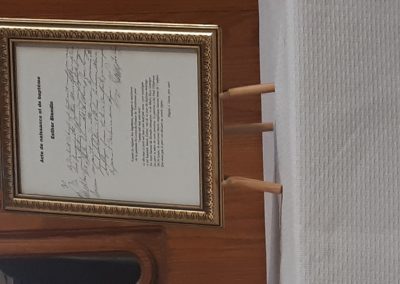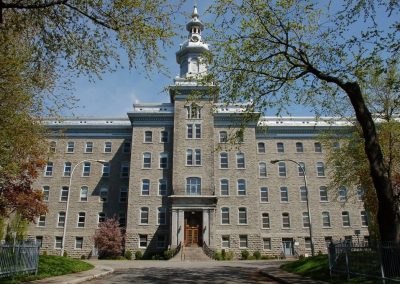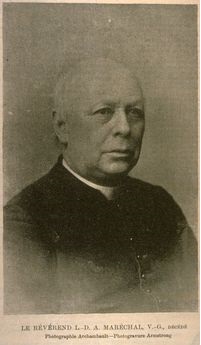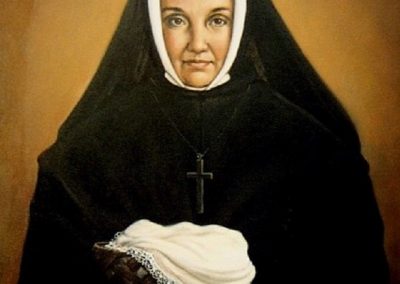Blessed Marie-Anne Blondin
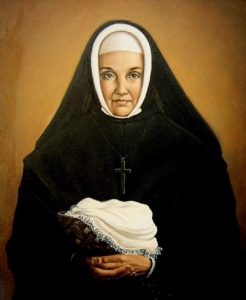 Esther Blondin was born on April 18, 1809 in Terrebonne, Quebec (formerly Lower Canada), into a poor but deeply Christian farming family that was generous to those in need. The parents, who were both illiterate, had 12 children. The mother had a particularly cheerful and friendly character, which she passed on to her daughter Esther. She had great confidence in Providence, which sustained her in the midst of life’s trials, and a marked love for the Eucharist. This was also evident in her daughter. Esther worked first as a servant for a merchant, then with the Sisters of the Congregation of Notre Dame to help her family. When she joined the nuns, a clause in the contract specified that one of them had to teach her to read. She entered the congregation in 1832 as a postulant and then entered the novitiate in Montreal. Her health did not allow her to continue her formation and she returned to her family. At the novitiate, she took the name Christine, which she kept once she returned to her family.
Esther Blondin was born on April 18, 1809 in Terrebonne, Quebec (formerly Lower Canada), into a poor but deeply Christian farming family that was generous to those in need. The parents, who were both illiterate, had 12 children. The mother had a particularly cheerful and friendly character, which she passed on to her daughter Esther. She had great confidence in Providence, which sustained her in the midst of life’s trials, and a marked love for the Eucharist. This was also evident in her daughter. Esther worked first as a servant for a merchant, then with the Sisters of the Congregation of Notre Dame to help her family. When she joined the nuns, a clause in the contract specified that one of them had to teach her to read. She entered the congregation in 1832 as a postulant and then entered the novitiate in Montreal. Her health did not allow her to continue her formation and she returned to her family. At the novitiate, she took the name Christine, which she kept once she returned to her family.
After her recovery, she began to teach in Vaudreuil in 1833, and became principal of the parish school because of her competence. The villagers even called the parish school the “Academy Blondin”. The number of children attending the school increased. However, she was very struck by the ignorance of the children in the countryside. She kept saying: “There is a void to fill and I feel called to this kind of apostolate. Encouraged by her parish priest, Father Archambault, and authorized by the Archbishop of Montreal, Monsignor Ignace Bourget, she created, in 1848, a new religious community dedicated to teaching. The archbishop, who first tested her, told her: “Try, see… never stop praying.” In 1850 she took her religious vows with four companions. She chose the name of Mother Marie-Anne. By 1853, the congregation already had 34 members and moved to Saint-Jacques de L’Achigan. The mother house was established in Lachine in 1834. The beginnings of the congregation were extremely poor. Sister Marie-Michel says: “We were happy in spite of our great poverty and the deprivations of all kinds, both for the premises and for food, we were poor and we lived as poor people […] Our food was that of the poor, and sometimes we did not have enough to satisfy our hunger.” Their parish priest said, “It is certain that there is no community in Montreal that has to suffer in all respects like the Sisters of St. Anne.”
One day, while Mother Mary Anne was at her desk, she heard what she interpreted as the voice of the devil telling her that he would destroy her community. After hearing this, our good mother summoned her daughters to tell them what she had heard, and to comfort them by 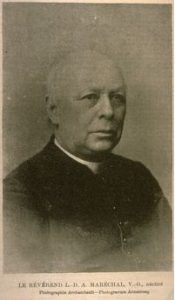 reminding them that the cross is the way that leads us to Christ.
reminding them that the cross is the way that leads us to Christ.
Shortly thereafter, the Bishop of Montreal appointed a new chaplain for the community. He was Father Louis-Adolphe Maréchal. The chaplain of the new congregation interfered in the government of the community from the time of his arrival in 1853, with an untimely and indiscreet zeal. The foundress objected, and in 1854, Bishop Bourget sacrificed Mother Marie-Anne and deposed her from her position: she had governed her community for only four years! She accepted with great humility, but, understandably, she became ill and almost died. Father Maréchal even wanted her to be expelled from the congregation. Her deposition as Mother Superior provoked a crisis in the young community that would last until the death of the foundress.
From that moment on, she was entrusted only with secondary duties. She remained faithful to her community, lived very poorly, remained a mother to her daughters and catechized the children. When she died in 1890, the congregation already numbered 42 houses and several hundred nuns. She had deeply forgiven those who had rejected her.
Paradoxically, Mother Marie-Anne lived a spirituality of hope and joy. She wrote in her Spiritual Notes: “Filled with feelings of deepest gratitude to my God for all the benefits I have received from his infinite goodness, I will give him the most sincere gratitude every day of my life, addressing to him with the Church, my good Mother, these words so full of unction and which leave in the souls of those who pronounce them with piety such a sweet feeling: Deo gratias, Deo gratias, Deo gratias and always Deo gratias. Oh, how delightful these words are, and how they never cease to be in my mouth, and the feeling in my heart. Deo gratias. Amen.”
Her love for others was also manifested for her sisters. A doctor called one day to the bedside of a nun said: “I could never have believed it, if I had not seen it with my own eyes, that people could love each other so much in religious communities. There is no mother in the world who loves her children more than Mother Marie-Anne loves her sisters.
The long ordeal she underwent united her to the glorious cross of Christ and made her enter into a paschal perspective, but always in the sense of Life. Her long silence did not close her in bitterness, but was, on the contrary, a source of love and life.
In the fall of 1889, her health deteriorated dangerously. Shortly after the Christmas party, she was diagnosed with severe bronchitis. A few hours before her death, she asked that the Abbé Maréchal be called, in order to reconcile herself with the architect of her disgrace. Louis-Adolphe Maréchal was deeply touched by this gesture of love, which led him to completely change his attitude towards the founder. It was he who presided at her very modest funeral a few days later. She was beatified on April 29, 2001, by Pope John Paul II. In July 2021, the remains of the Blessed were transferred to the cathedral of Saint-Jérôme by Bishop Raymond Poisson.
Sources:
PEYROUS Bernard et POMPIGNOLI Marie-Ange, La sainteté Canadienne, édition Novalis, chapitre IV, pages 230-233

